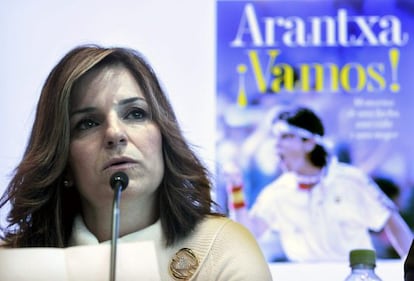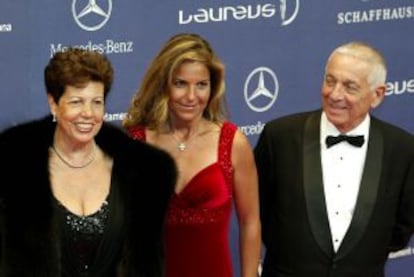What happens when family interference turns sport into hurt
The recently aired tribulations of Arantxa Sánchez Vicario are far from uncommon in the pressurized world of young athletes

"Marisa: my faithful shadow at all my tournaments until I turned 20, is a strong-willed woman for whom discipline and victory came ahead of any other consideration, when perhaps what I really needed at the time were a few words of sympathy," writes the former tennis champion Arantxa Sánchez Vicario about her mother in her new biography ¡Vamos!
"It's clear that we failed with her," retorted Marisa Vicario in a press release following the presentation of her daughter's book last Tuesday. "For 20 years we were devoted to her. We put everything aside for her, mortgaging our lives and our marriage."
Both sentences capture the breakup of a family. Their case is not unique, either. Some sports have changed their own rules to factor in the parents. There are clubs where parents are strictly prohibited from attending training sessions; a few judges have granted young athletes early emancipation to spare them negative influence from their mother or father.
When children turn professional in any given sport, their relationship with their core family members runs the risk of being altered, according to sports psychologists. These experts describe two extreme outcomes: the child tyrant who ends up dominating their parents on the strength of their success and money, and the over-pressured child who suffers from their family's high expectations and stifling control.
"What happened in this case, viewed from the outside, is not such an odd thing," says José Manuel Beirán, an Olympic silver medalist in basketball and a sports psychologist. Although Beirán is a supporter of the beneficial effects of sports on most children, he admits that "in athletes that start playing at the professional level so soon, parents naturally need to be on top of them, and sometimes, with the best of intentions, they create unrealistic expectations that derive into risk situations."
Competitive sports that begin early, such as tennis, are especially dangerous"
"Sports where competition begins early, such as tennis, are especially dangerous," he continues. "The parent becomes a source of stress for the children, whose life at that point is devoted to pleasing their parents. They do not feel that they are playing a match or a tournament, but that they are playing to improve the atmosphere at home, or simply out of love for their parents.
"Children who succeed in elite sports give up a certain number of things that they're not aware of until later in life," adds Beirán. "Arantxa, for instance, began competing when she was really young. Also, parents are more on top of girls, until they become independent. It's important for the family to keep the athlete grounded and provide emotional balance, but there are parents who view their children's careers as an extension of their own, and their children's successes as their own."
"Mary, kill that bitch!" The phrase is attributable to Jim Pierce, father of Mary Pierce, the French tennis player who won two Grand Slam titles. Jim Pierce was expelled from Roland Garros and barred from the French team meetings for five years after hitting, insulting and threatening his own daughter on several occasions. This led tennis officials to create special regulations to keep abusive parents and trainers under control; it also reflected the fact that these cases often occur in individual sports that are open to very young players whose personalities are still being formed and who are subjected to a life of constant travel.
Mary, kill that bitch!" is attributed to the father of French star Mary Pierce
Arantxa, just like Mary Pierce, eventually quarreled with her family. They are not the only ones. Australia's Jelena Dokic reported being abused by her father, who was barred from entering tournaments, and the French federation was forced to hire bodyguards to prevent the father of Aravane Rezai from assaulting her rivals.
"My father taught me how to play when he was stationed in Melilla," explains Feliciano López, 30, who is currently 15th in the ATP ranking. Feli, as he is popularly known, had a three-for-one system at home: his father was also an army lieutenant and his personal trainer.
"Although he kept giving me advice, when I turned 10 he stopped being my trainer. It's not an easy relationship," he says. "Every day there is friction, there is a lot of time spent together, from what I've seen on the circuit. I didn't have that problem, but I have seen it in others."
Thoughtful even under extreme stress, last summer Feli did the following thing during a match at Wimbledon: when he noticed his father, who was sitting on the sidelines, grimacing in desperation over the outcome of the game, he walked over in the middle of a decisive tie-break and said: "Dad, please, calm down."
"He's a very nervous guy," Feliciano laughs over the phone as he recalls the incident. "The person on the sidelines needs to convey a sense of calm. I was lucky. Both my father and my mother were demanding when it came to our studies, and they instilled positive discipline in us. Becoming a tennis pro is very difficult. My brother was brave: he dropped tennis at age 16, got a degree in economics and business administration, and is now a happy man. Other parents insist on their children turning pro. That's the biggest mistake a parent can make. Not all kids like sports so much as to make that kind of sacrifice. You also need to study."
Family conflicts, of course, are not the exclusive domain of tennis or of female athletes. Mickey Mantle, one of the best players in baseball history, used to wet his bed until he was 16 years old. His biography, A hero all his life, explains how that was one of his reactions to the pressure that his father placed him under; their relationship included a lot of love, toughness and up to 14 hours of training a day as a child.

Meanwhile, it is impossible to understand the iron will of the cyclist Lance Armstrong without knowing that his father left his mother when he was still a child. The gymnast Dominique Moceanu, a gold medalist at the 1996 Olympic Games, got a court to grant her emancipation from her parents. Jennifer Sey, a US champion in the same sport, wrote a book that described a world of merciless trainers, overzealous parents, eating disorders and failed Olympic dreams.
"When children become elite athletes, family life needs to be readjusted," explains Fernando Gimeno, a professor of sports psychology at Zaragoza University. "Many families are financially conditioned by the sport, or else they decide to move to help with their child's training."
Gimeno, who notes that sports should bring positive things to a child, says that parents can err on the side of excess or defect. "Either they stifle the children and prevent them from maturing and becoming self-sufficient, or they create problems by failing to provide support and recognition. Every father and mother out there should be able to look at Arantxa's case and think, 'What would I not want my child to blame me for, years down the road?'"
Gimeno notes that this type of parent-child relationship is not exclusive to sports, and can manifest itself over academic or professional issues as well.
The person on the sidelines needs to convey a sense of calm"
But is this type of tension as common in team sports, where children's matches are held every weekend and parents can be heard howling at their kids from the stands?
"Team sports are different, because you don't need to make such a huge investment in terms of time and money so early on," says Beirán. "It usually starts at school, and the pressure gets diluted within the group, because the results do not depend on one person alone... But the pressure also increases with the money at stake."
"When the child sees that the whole family has moved to a different city just for their sake, or when they start signing major contracts and making more money than their parents, they can turn into tyrants. Preventing this is up to the parents, who should not turn them into the star of the house and should keep their feet firmly on the floor," he warns. "Then again, you can get the opposite case: parents who stress out the child by constantly reminding them that the whole family moved just for their sake."
These cases are easy enough to find in soccer and basketball, although not only in those sports. Teams that are particularly devoted to training young players, like Sevilla FC, which trains over 400 kids aged seven and up, have had ample time to analyze the issue. In order to produce players like Sergio Ramos, José Antonio Reyes, Antonio Puerta or Jesús Navas, something else is needed besides natural talent: good facilities and trainers, an entire team of psychologists who periodically write to the parents, and a few strict rules. The first and most important of them all is that parents are categorically prohibited from showing up at training sessions.
Dominique Moceanu got a court to grant her emancipation from her parents
"Family pressure exists, although sometimes it is more evident and other times less so," says Pablo Blanco, head of the Seville club's youth academy. "For some parents, the main goal is for their kids to make it. They pressure them into being soccer players, and the kids no doubt feel that pressure. That is often detrimental. That's why, five years ago, we barred parents from attending training sessions."
Blanco, who notes that Barcelona FC does the same thing several days a week, explains that their own psychologists sent a letter to parents underscoring all the benefits of not having them around: players get to be praised and criticized by the coach more freely. It also prevents parents from trying to direct part of the training session.
"They used to cry out things like, 'Keep going! Run! Go!' The family environment has a huge influence on the soccer player, who is always a very young person. In the case of low-income people, the weight of the family falls more heavily on them."
This former player makes one last comment based on personal experience. "It's funny, but the most talented players are those who feel cold more often, who have fewer blankets to cover themselves with, who come from underprivileged family conditions. Now, with the crisis, a lot of parents try to pressure us financially, telling us that they've had offers from other clubs."
Arantxa is embroiled in four family lawsuits over control of her fortune
"The vociferous parent or spectator is an unfortunate reality; it is not the most frequent case, but it is the most noticeable one," notes Gimeno about the accompanying adult who screams at the child from the stands. "It's a terrible thing for the child, for whom sports morphs from something to have fun with to a life or death situation."
"And all these risk situations can cause trouble at the end of an athlete's career, when retirement comes around," says Beirán. "There are team leaders and coaches who encourage limiting the athlete's life to his or her sport. But that's very dangerous. Athletes must have something else to hang on to. In extreme cases, otherwise, they might get the feeling that the people around them - friends, partners - are only there because of their fame and their success, and not because of the way they are as individuals."
Arantxa's case is now fodder for the television gossip shows, which are busy deconstructing every last detail of the bitterest aspects of her life. Every day, newspapers and magazines analyze the coming apart of a family that was a role model and icon of Spanish sports in the 1990s. Arantxa is now embroiled in four lawsuits against her relatives over control of her fortune, which experts estimate at 30 to 45 million euros. Arantxa, the public figure, is in the spotlight 24 hours a day. About Arantxa, the married woman and mother of two, all we know is that her life is still scarred by her experience as a teen tennis player.
Tu suscripción se está usando en otro dispositivo
¿Quieres añadir otro usuario a tu suscripción?
Si continúas leyendo en este dispositivo, no se podrá leer en el otro.
FlechaTu suscripción se está usando en otro dispositivo y solo puedes acceder a EL PAÍS desde un dispositivo a la vez.
Si quieres compartir tu cuenta, cambia tu suscripción a la modalidad Premium, así podrás añadir otro usuario. Cada uno accederá con su propia cuenta de email, lo que os permitirá personalizar vuestra experiencia en EL PAÍS.
¿Tienes una suscripción de empresa? Accede aquí para contratar más cuentas.
En el caso de no saber quién está usando tu cuenta, te recomendamos cambiar tu contraseña aquí.
Si decides continuar compartiendo tu cuenta, este mensaje se mostrará en tu dispositivo y en el de la otra persona que está usando tu cuenta de forma indefinida, afectando a tu experiencia de lectura. Puedes consultar aquí los términos y condiciones de la suscripción digital.









































